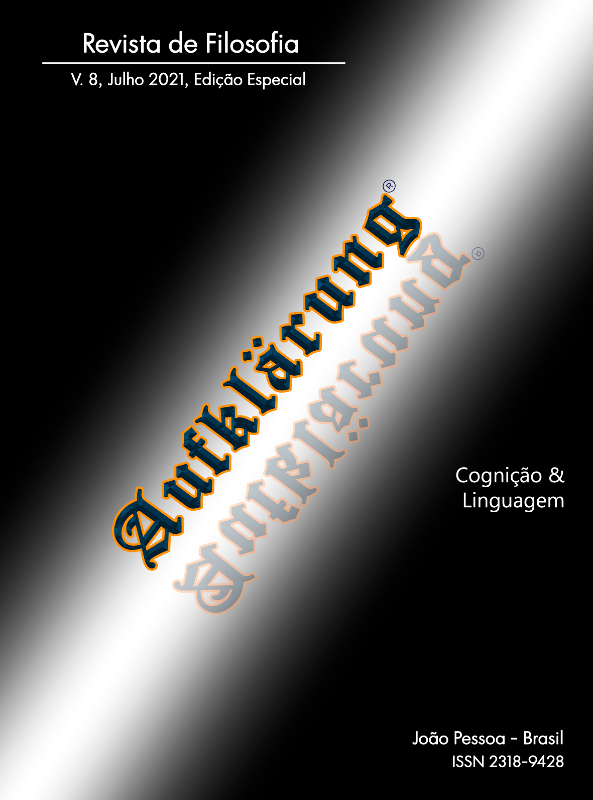Why Later Wittgenstein was not a therapist
DOI:
https://doi.org/10.18012/arf.v8iesp.60023Palavras-chave:
Wittgenstein, philosophy, therapy, mind, internal relations, external relationsResumo
Wittgenstein famously regarded philosophy as an activity and not as a body of doctrine. And yet within the secondary literature there is little agreement as to what Wittgenstein took the purpose of that activity to be. In this paper, I claim that the purpose of philosophical activity, at least according to the Later Wittgenstein, was to solve philosophical problems. As support for this claim, I argue that our everyday talk about the mind presents us with a philosophical problem about the mind. Focusing then on what Wittgenstein says about understanding and using his distinction between internal and external relations, I show how we can solve this problem. If my reading is accepted, then the purpose of philosophical activity, according to the later Wittgenstein, was not therapy. As such, later Wittgenstein should not be read as a therapist.
Downloads
Referências
BAZ, A. Wittgenstein on aspect perception. Cambridge: Cambridge University Press, 2020.
CRARY, A.; READ, R. (Eds.) The new Wittgenstein. London; New York: Routledge, 2000.
GLOCK, H. A Wittgenstein dictionary. New York: Blackwell Publishers, 1996.
LOUGHLIN, V. Why enactivists should care about Wittgenstein. Philosophia, 2020. (Ahead of print) https://doi.org/10.1007/s11406-020-00286-3.
MACHA, J. Wittgenstein on internal and external relations: tracing all the connections. London; New York: Bloomsbury Academic, 2015.
MOYAL-SHARROCK, D. Wittgenstein’s razor: the cutting edge of enactivism. American Philosophical Quarterly, v. 50, n. 3, p. 263-279, 2013.
MOYAL-SHARROCK, D. The myth of the quietist Wittgenstein. In: BEALE, J.; KIDD, I. (Eds.) Wittgenstein and scientism. London; New York: Routledge, 2017. p. 152-174.
STERN, D. How many Wittgensteins? In: PICHLER, A.; SAATELA, S. (Eds.) Wittgenstein: the philosopher and his works. Frankfurt: Ontos Verlag, 2006. p. 205-229.
STROLL, A. Wittgenstein. London: Oneworld Publications, 2002.
SUSSWEIN, N.; RACINE, T. R. Wittgenstein and not-just-in-the-head cognition. New Ideas in Psychology, v. 27, n. 2, p. 184-196, 2009.
WITTGENSTEIN, L. Remarks on philosophical psychology - v. 2. Chicago: University of Chicago Press, 1988. (RPP II)
WITTGENSTEIN, L. Last writings on the philosophy of psychology: the inner and the outer, vol 2. London; New York: Blackwell Publishing, 1992. (LWII)
WITTGENSTEIN, L. Philosophical Occasions: 1912-1951. Edited by J. Klagge and A. Nordmann. Indianapolis; Cambridge: Hackett Publishing Company, 1993. (PO)
WITTGENSTEIN, L. Tractatus logico-philosophicus. London: Routledge, 2001. (TLP)
WITTGENSTEIN, L. Philosophical investigations. Oxford: Wiley-Blackwell, 2009. (PI)
Abbreviations for Wittgenstein’s works
TLP = Tractatus Logico-Philosophicus;
PI = Philosophical investigations;
PO = Philosophical Occasions;
LW II = Last Writings on Philosophical Psychology, volume 2;
RPP II = Remarks on Philosophical Psychology, volume 2.
Arquivos adicionais
Publicado
Como Citar
Edição
Seção
Licença

Este trabalho está licenciado sob uma licença Creative Commons Attribution 4.0 International License.
Política de Direito Autoral para os itens publicados pela Revista:
1.Esta revista é regida por uma Licença da Creative Commons aplicada a revistas eletrônicas. Esta licença pode ser lida no link a seguir: Creative Commons Attribution 4.0 International (CC BY 4.0).
2.Consonante a essa politica, a revista declara que os autores são os detentores do copyright de seus artigos sem restrição, e podem depositar o pós-print de seus artigos em qualquer repositório ou site.
Política de Direito de Uso dos Metadados para informações contidas nos itens do repositório
1. Qualquer pessoa e/ou empresa pode acessar os metadados dos itens publicados gratuitamente e a qulquer tempo.
2.Os metadados podem ser usados sem licença prévia em qualquer meio, mesmo comercialmente, desde que seja oferecido um link para o OAI Identifier ou para o artigo que ele desceve, sob os termos da licença CC BY aplicada à revista.
Os autores que têm seus trabalhos publicados concordam que com todas as declarações e normas da Revista e assumem inteira responsabilidade pelas informações prestadas e ideias veiculadas em seus artigos, em conformidade com a Política de Boas Práticas da Revista.






































